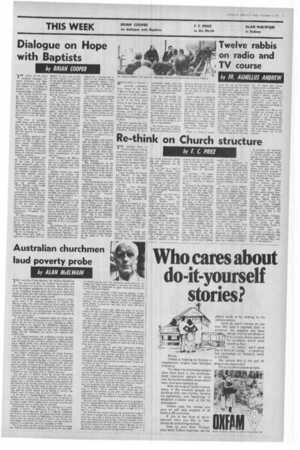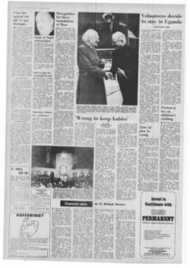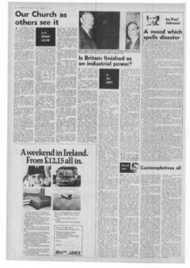Page 3, 3rd November 1972
Page 3

Report an error
Noticed an error on this page?If you've noticed an error in this article please click here to report it.
Tags
Share
Related articles
The Menace Of Christianity Calling To Each Of Us
Questions From Scotland Road
Eastern Churches Society
Missionaries Use The Gospel As The Measure Of Leaven To...
New Life In The Church
Re-think on Church structure
by F. C. PRICE HE existing form of Church structure, with its emphasis on parochialism, is antiquated and unsuitable for modern mission and ought to be replaced by "other forms" of Christian presence such as house-churches and action groups says a report published this week.
Called "Enabling the Church for Mission," it has been drawn un by an ecumenical working party in connection with the Call to the North Campaign.
It says: "The Christian. Faith as such is not under wholesale rejection, as there remains a considerable latent respect for it, but the organised Church as an expression of Christianity is."
Among the complex of factors responsible for this state of affairs the report includes: "The tendency in the past for the Church to be aligned with the status quo and often with privilege and establishment
"The manner in which she reacted to new knowledge and disciplines, appearing to fight a rearguard action only to surrender in the end.
"The legacy of large and somewhat ugly premises left over from the extravagant building spree in the second
half of the nineteenth century and the hesitancy of the Christian apologetic over the last 50 years."
It says that in a time of rapid social change, "with cultural patterns and standards in constant flux," the Church is "equipped with a rigid structure which in some cases requires years of tedious work to adjust" and "lacks an effective decision-making machinery for the speedy deployment of resources."
The report says that this is unfortunate because the Church always carries "a built-in burden" — the people who are attracted "because they seek for security in a changing world and culture, and want her to have a static structure, rigid theology and legalistic morality."
According to the report the Churches are still comparatively strong "in areas where there is a sense of community solidarity" and instances "villages, market towns and working-class areas with strong Irish Catholic concentrations."
But it argues 'that the Church's mission to the city
centres and "key areas of life" tends to become "an optional extra because the local resources cannot support much church plant or personnel there."
It continues: "This underlines the need for the deployment of Church resources to be on a national or regional basis."
Turning to the relationships between• clergy and laity, the report states that the clergy are "as dominant within Protestantism as Catholicism, so that mission is usually reckoned to be the prerogative of the clergy or that for which they should provide the leadership, dynamic and expertise."
All the Churches are criticised for concentrating the major part of their resources "upon local congregational units and organisations." This results in "an excessive concern for the local church building and its maintenance. with consequent narrowing of Christian loyalties," and suggests "that the only right form for the Church lire must be that of the local church congregation gathered in the local building mainly on a Sunday."
The report continues: "It focuses much Church concern upon domestic life, family life, personal ethics, neighbourhood problems, but tends to limit concern within those areas. It makes response to population mobility difficult, since formal church buildings are so central."
So far. the report suggests, these rigid structures have barely been touched by ecumenical developments. While a few areas, eotably Skeh-nersdale and Teesside, have established team ministries "the ecumenical movement is only just moving out of the polite, tentative inquiry stage."
It urges that "it is critically important for ' the Church jointly to develop regional ecumenical bodies which have some effective power and are not merely consultative."
The report states that "bodies like the Councils of Churches are deplorably weak and are often regarded as a shop-front to show that we really arc keen on ecumenism. But they are short of ability to effect any significant activity."
It advocates the formation of "ecumenical mission teams" to "service mission to more spheres of living than merely the domestic neighbourhood."
Here, however, there were certain difficulties, because "the management and trade unions both agree that if an industrial mission presence is to be permitted it would have to be granted to Free Churchmen and Catholics also.
• "It would thus introduce Christian divisions into the works and exacerbate tensions," says the report. Therefore it calls for "house churches, action groups formed round special Christian concerns such as alcoholics and drug addicts, and layclergy 'orders' formed to exercise a group discipline and promote specific patterns of Christian obedience and witness on the lines of the Iona Community."
It also suggests "Christian cells within specific professions, Christian youth communities centred on coffee bars and Christian houses in underprivileged areas."
The report argues that "these forms are just as valid as the local congregation, and need extensive support or they, too, develop their own style of parochialism."
blog comments powered by Disqus











